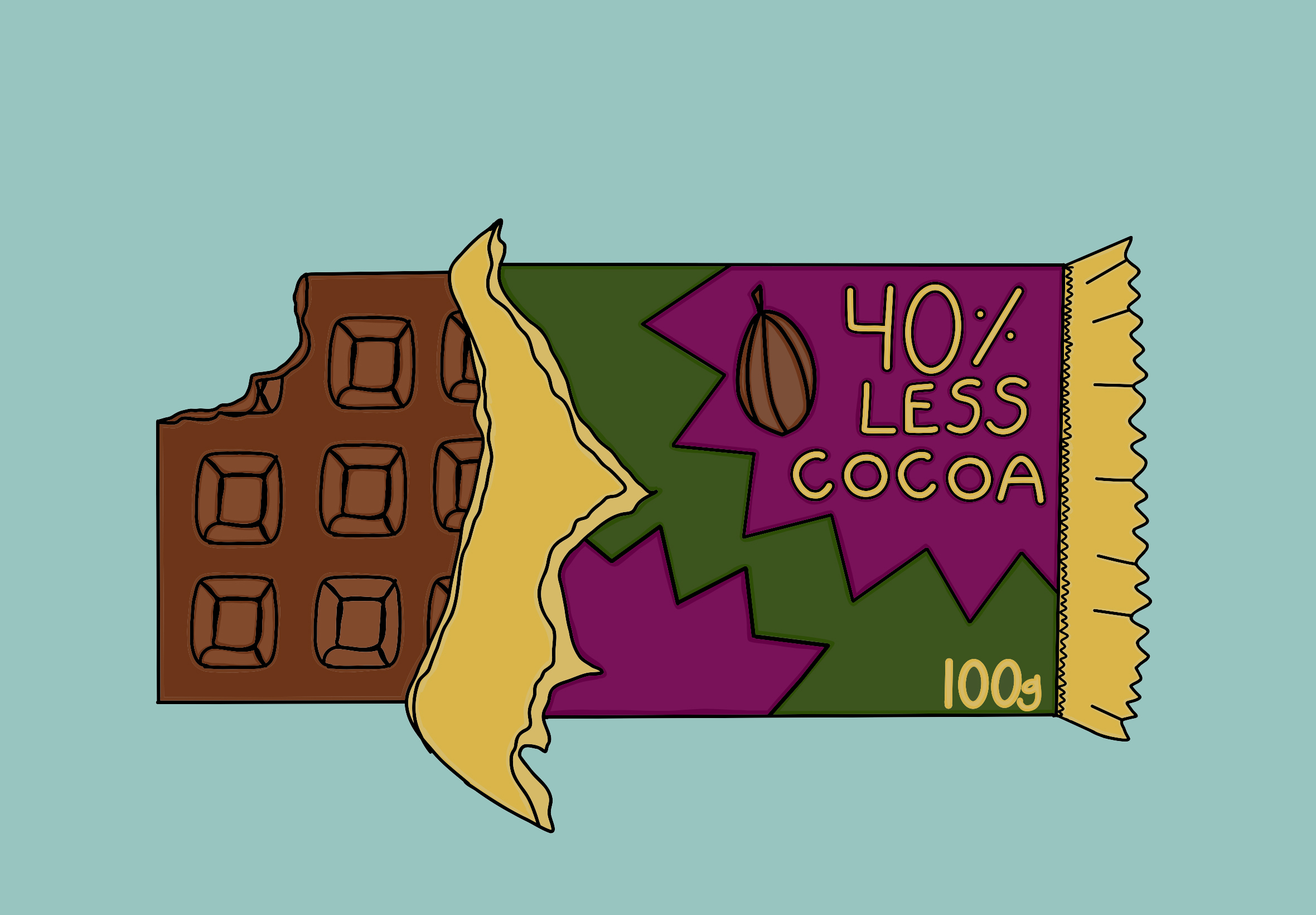Dr. Sophia Carodenuto conducting research with a lab on sustainable cocoa production

Illustration by Sona Eidnani.
Cocoa, a commodity grown in the jungles or tropical rainforests of Central and South America under a canopy of dense trees, is at risk.
The global cocoa shortage has been in effect due to rising temperatures in regions where cocoa grows, as well as unpredictable rainfall and severe drought. There are also various crop diseases affecting the amount of cocoa production.
Amidst this, Dr. Sophia Carodenuto, an associate professor in UVic’s geography department, has been doing research on agroforestry and agroecology — the broader term — looking for sustainable ways to grow cocoa that would reduce deforestation rates in the regions where cocoa is produced.
She has been focusing her latest research on the sustainability of global value chains and commodities that impact forests, such as cocoa. Her studies focus on the environmental sustainability and social equity of agriculture commodities, as well as looking at the environmental implications of deforestation.
“Cocoa grows best in the same areas that tropical rainforests do best,” Carodenuto told the Martlet. “That’s the tropical forest risk.” This is why many rainforests have been converted to agriculture systems; to better accommodate the growing need of cocoa production.
She points out that conversion from forest to agriculture has been happening since time immemorial. But, it’s important to analyze the rate of the conversion and how it is happening, said Carodenuto.
“Are we planting trees and domesticating land to have a little bit of food, or are we having massive conversion of tropical rainforests to plant monocultures that are no resemblance to the rainforests that were previously on that land?” she said.
With the help of the Social Sciences and Humanities Research Council (SSHRC), a federal funding agency that supports social sciences and humanities research, Carodenuto has been able to look closely at deforestation due to cocoa in Côte d’Ivoire and Ghana. The two countries together produce 65 per cent of the world’s cocoa in monoculture systems.
But the monoculture system has been proven to not be very resilient. “It is highly susceptible to climatic changes and erratic rainfall, and high temperatures have decimated a lot of the cocoa farmland,” Carodenuto said.
In addition, a swollen shoot virus among the trees in Côte d’Ivoire and Ghana has decreased the cocoa production in the region.
“If you have the major producers of cocoa in the world having a significant decrease in how much cocoa they are able to produce, it’s a simple supply-demand equation where the price goes up because there’s not as much supply on the market,” Carodenuto said.
Carodenuto’s research heavily centres on agroforestry, which is one way the cocoa industry is looking to make cocoa production more sustainable in west Africa. Agroforestry functions by integrating trees into farmland to replicate the ecosystem of a tropical rainforest, where cocoa natively grows. This creates the ability to produce cocoa in a more resilient and predictable way.
Recently, Carodenuto took a team of 13 undergraduate students to look at agroecology in Belize alongside the Belize Foundation for Research and Environmental Education (BFREE). The team analyzed the kinds of cocoa production being established that support biodiversity, soil health, and carbon storage in the ecosystem.
Carodenuto is currently working alongside a team of undergraduates, graduates, and postdoctorates in a geography lab. Their team is called the Environmental Governance Group (EGG). EGG is advocating for Canada to implement import regulations that would ensure that Canadians are consuming cocoa and other food products that meet environmental and social labour regulations.
Carodenuto encourages individuals to pay attention to where their cocoa products are being sourced, and to do research about the source of a product before buying it.
An average chocolate consumer may notice chocolate becoming more expensive. If individuals choose to stop buying chocolate due to the higher prices, then cocoa farmers make less money. Carodenuto points out that even though chocolate prices may go up, it does not mean that farmers’ wages will follow this trend.
“There’s a lot of work to be done around increasing the price that cocoa farmers get for their product,” she said.
One way UVic students can contribute to promoting agroforestry is by raising awareness about the issue, as well as thinking about regulation surrounding commodities in Canada. “I think the role of students here at UVic … is education and awareness,” Carodenuto said.
By implementing agroforestry, cocoa can save the rainforests.







